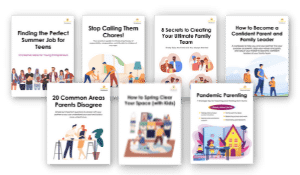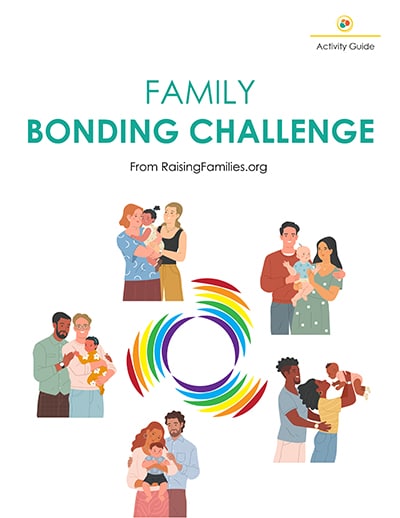- Home
- »
- Family Bonding Challenge
- »
- 10 Healthy Habits for...
10 Healthy Habits for Kids

Age: 4+
Time: 15+ minutes
Materials: depends on activity
Focus: family communication
Healthy habits for kids involve more than just teaching them how to eat a balanced diet. Healthy habits encompass the well-being of the whole child and include their spiritual, mental, and emotional health.
This is an excellent time to share your healthy habits with your kids. You will be not only passing on some of your values but also helping your child develop a healthy lifestyle that will serve them for the rest of their life.
1. Everything in moderation.
This can apply to everything. You can use it for sweets, screentime, and even exercise. Sweets can be a nice treat occasionally, but when eaten regularly or in excess, they’ll cause problems.
The same can be said for exercise. Although you need to exercise to keep your body healthy, too much exercise can cause strain and injury. Finding balance is what you’re after.
2. Feelings are normal.
Let your child know it’s normal and okay to have feelings by validating them verbally. “It looks like you’re angry. I’d be angry, too, if that happened to me.”
When we help our kids name what they’re feeling and let them know how we’d feel if the same thing happened to us, it helps them to learn how to handle their emotions.
You can take things a step further by asking if they want help dealing with the situation or just want to talk about it. If they just want to talk or vent, then make sure you stick to your agreement and just listen.
Sometimes kids can figure out what they want to do on their own by talking about a situation, or just talking will help them process so they can move on.
3. Get outside.
Have your child spend some time outside every day, if possible. Spending time outside allows your child to get vitamin D, which is important for growth and the immune system.
Make sure to talk about staying safe in the sun with sunscreen and/or protective clothing too. Again, everything in moderation. Some sun is great, but too much isn’t.
By getting outside, your child will have a chance to ground themselves in nature, go for a walk, ride a bike, or take part in any number of physical activities that will get their bodies moving.
4. Decompress.
Sometimes you just need to let things out. Bottling everything inside or keeping it all in isn’t good for you.
Help your child learn safe ways to let their feelings out. Do you feel better after yelling into a pillow, or do you have a dammit doll that you whack on the table? Maybe you take a hot bath or go for a long run?
How do you release turmoil? Work with your child to find something that works for them.
5. Have fun.
All work and no play is no fun at all. Finding balance in life is extremely important to a healthy lifestyle.
When you know you’ll be able to have fun later, you’re more likely to be able to buckle down and get to work when you need to. Ask your child what they enjoy doing for fun, then do that with them. This is also a great time to share things you enjoy with them.
6. Try new things.
Encourage your child to try something new. They just might find something they love to do. Even if they don’t, they’ll have gained some new skills.
Trying something new can be scary and nerve-racking. By trying something new, your child will have an opportunity to deal with these feelings in a safe environment.
It will also give them a chance to fail. Learning something new can be difficult. But failure is a part of learning and is okay. Sometimes you have to fail before you can succeed. If your child fails, let them know that it’s a part of learning, then share a time when you failed. Learning to persevere will help your child throughout their life.
7. Set goals.
Learning to set goals allows your child to think about what they would like or where they’d like to be in the future. Start off with short-term goals and as your child grows, help them pick some long-term goals as well.
Regardless of whether they reach their goals or not, praise the effort, not the result.
8. Get enough sleep.
Sleep is so important. By getting the proper amount of sleep, your child will be at their best to handle the day.
When kids don’t get enough sleep, they’re starting their day at a disadvantage. They can be irritable and have a hard time concentrating. You can see how much sleep your child should be getting here.
9. Talk about your beliefs.
Spiritual beliefs can support a person when they need support the most. Share your beliefs with your child and let them know what type of role your belief plays in your life.
If your family goes to church, your child will already have some knowledge of this and the community your faith brings. If not, your child could be clueless when it comes to your beliefs and what they mean to you. The next time you’re in a situation where your spiritual beliefs play a role, let your child know what that role is.
10. Set the example.
When your kids see you following these tips, they’ll easily pick them up too. If, however, you don’t do any of these things, you’ll be hard-pressed to get them to do them.
Kids will do as you do, not as you say. If you’re constantly staying up late and can’t get out of bed in the morning, chances are, your kids won’t go to bed when they should either. They’ll want to stay up just like you. By following these tips, you’ll be creating a better lifestyle for yourself and your child. If you struggle with any of them, be open about your struggles. Talk with your child and see if the two of you can come up with a way to improve.
Join the Community!

Get Excited About Your Future
Delight your inbox with monthly lessons carefully chosen to help you grow as a proactive parent who's always looking to learn more about raising a strong family team.

Monthly Live Engagement
Join our monthly live chats to discuss each month's topic in-depth and get all your questions answered.

Worksheets and Guidebooks to Grow Better Together
Members receive many of our guides for free and access to deep discounts to the entire collection to continue growth and development together.
Carolyn Savage
Carolyn is a writer, proofreader, and editor. She has a background in wildlife management but pivoted to writing and editing when she became a mother.
In her "free time" she is a 4th Dan (degree) Kukkiwon certified black belt in Taekwondo, loves learning to craft from her enormously talented children, and then teaching what she's learned to her enormously talented grandmother. Read full bio >>


